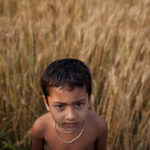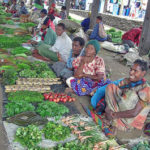

Dramatic decline in food production in Asia & Pacific
March 26, 2014
“Centres of excellence needed to fight climate change impacts”

The International Food Policy Research Institute has released new figures for the impact of climate change in Asia and Pacific countries. Dr Mark Rosegrant, presenting at the Australian Ag & Resource Economics Society Conference, predicted dramatic falls in staple crop production.
The international study is predicting dramatic falls in staple crop production in the Asia-Pacific due to climate change, with a 20 per cent reduction in irrigated rice and up to 25 per cent fall in irrigated wheat production.
Dr Mark Rosegrant, Director of the Environment and Production Technology Division at the International Food Policy Research Institute assessed the impacts of climate change on agricultural production, prices of major commodities, calorie availability and child malnutrition in the Asia-Pacific Region in 2050 under climate change compared to a no- climate change scenario.

“Sadly, childhood malnutrition levels, which are directly linked to calorie availability, are projected to increase dramatically under climate change between 9-11 million children, in addition to the 65 million children projected to remain malnourished in 2050 even under current climate conditions in Asia,” he says.
The Professor believes that it will be difficult but not impossible to avoid such a scenario. “Aggressive increases in agricultural research, rural roads, and irrigation investments will cut about three-quarters of the increase in childhood malnutrition due to climate change. Nonagricultural investments for clean water and maternal education further reduce child malnutrition.
“Australia has a strong record of supporting agricultural research in Asia and the Pacific through AusAID and the Australian Centre for International Agricultural Research.”
“In addition to increasing national agricultural research investments in the Pacific, it is essential that regional cooperation for agricultural research be improved. The individual countries lack the necessary critical mass of scientists and facilities to address the breeding challenges in order to drive productivity growth under climate change.
“Australia is ideally situated to assist in establishing one or more regional centers of excellence that link national research institutions across countries and access services from international agricultural research centers, generating economies of scales and access more advanced techniques, such as marker-assisted selection and cell and tissue culture techniques.

“Countries need to increase agricultural adaptation funding. Most adaptation investments are also good development policy, but due to climate change, higher investments will be required to meet development goals.
“Another important adaptation policy is the provision of market and climate information, including integrated data management, monitoring, and evaluation systems for agriculture from the community to the national level. “The global agricultural trading regime should be further opened so that the risks associated with climate change can be shared and thus resilience increased. “Extension systems need to be revitalized to incorporate strong local participation and effective coordination of public, private, and NGO providers,” he said “In the Pacific Islands, institutional development is particularly important for climate change adaptation. “Rationalizing land policy will be necessary to retain indigenous land ownership, while securing commercial land use rights. The creation of land banks and incorporated land groups will help in this regard,” he said.
The Crawford Fund managed the media outreach around Dr Rosegrant’s address at the AARES conference, which included ABC TV, Wall Street Journal, ABC Canberra, and radio reports linked below:




